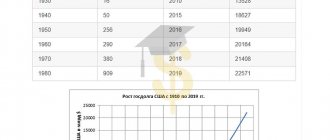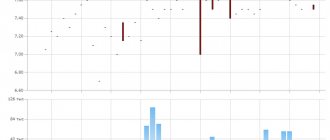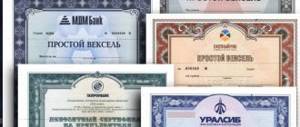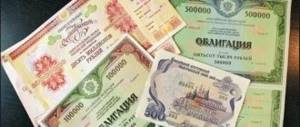To attract investment, companies and funds, both public and commercial, issue bonds that are issued to individuals and legal entities, have a specific value and are subsequently repaid with interest. The state-owned Vnesheconombank also issues such securities, through which it replenishes the state budget, and citizens can not only make a contribution to the country’s economy, but also make a profit from the purchased security. Not everyone knows how and where you can purchase Vnesheconombank bonds, but future investors need to figure it out.
What are the benefits of short-term bonds?
Short-term bonds, compared to other subtypes of these securities, are distinguished by their extremely short maturity dates - not exceeding a year. Short-term bonds are much more convenient than long-term bonds or deposits in that they allow you to keep your finger on the pulse of the market; when placing for a short period, it is more convenient to adjust to the favorable interest rates of banking products and transfer money on time to receive a high income.
Short-term bonds are also beneficial due to their ease of purchase and handling - in the financial supermarket ETP GPB, short-term bonds are issued weekly, and the trading platform provides comprehensive advice when filling out a simple form.
If you want to get familiar with the securities market, understand the principles of operation and settlement in a transparent system, or are looking for an ideal option for a short-term investment of funds with a high income, short-term bonds for 14, 21 and 28 days of Vnesheconombank will be an ideal option.
Taxation of international bonds for individuals
If international bonds are purchased on the Russian market, only municipal and state Eurobonds of the Russian Federation will not be subject to coupon income tax. Personal income tax on the sale of securities with a positive balance must be paid on all instruments.
Let me remind you that its size is 13% of profit. All taxes will be calculated in rubles, regardless of the bond currency. Let me remind you once again about the possibility of obtaining a tax deduction when using an individual investment account, which can be opened with any local broker.
Pros and cons of short-term bonds
Any financial instruments have both their positive sides and their pitfalls. The advantages of short-term bonds include:
- reliability – if you purchase bonds from a reliable issuer, then you are guaranteed income on time;
- variety - even within the framework of virtually one product, short-term bonds of Vnesheconombank on the GPB ETP have at least three variations in terms of terms, as well as the possibility of extension;
- easy withdrawal of money and transparent financial part - in modern trading platforms, purchasing and repaying bonds is extremely simple.
The only clear disadvantage of short-term bonds is that they, like other securities, do not participate in the deposit insurance system. However, compared to other riskier securities investments, bonds are safer when you choose a reputable issuer.
How to buy short-term bonds of Vnesheconombank?
The ETP GPB Financial Supermarket offers Vnesheconombank bonds with maturities of 14, 21 or 28 days and with the possibility of extension. To buy short-term bonds, use our electronic platform - modern technologies and design will make the purchase extremely simple. You can also order a consultation with us on all questions that interest you by using the form (here is a hyperlink).
Short-term bonds of Vnesheconombank are a reliable investment on favorable terms, and on the GPB ETP you can control the purchase and repayment process without any difficulties!
What does VEB offer?
Vnesheconombank predominantly produces ruble bonds, thus supporting the national currency; there are 23 issues of different volumes. Next in number are dollar securities, of which there are currently 7 issues in circulation; VEB issues the least number of bonds in euros, only one issue is currently in circulation. Such securities are called government bonds and involve a country borrowing money from the population and then paying the money back in a larger amount.
In total, there are now 607 billion rubles in ruble bonds in circulation, 6.75 billion in dollars, securities issued in euros are traditionally issued in smaller quantities. The volume of the latter is at the level of 500 million, but the issues are split into smaller parts of different values, for example at a price of 1000 rubles, so that investors can invest funds and thus support the economy of the Russian Federation.
What it is
An international bond is a debt security issued in a foreign currency to be traded in different markets. In terms of structure, these are classic bonds, i.e. they provide for the payment of regular coupons and the redemption of the face value at the end of circulation.
There are several types of international bonds. First of all, they are divided into long-term bonds and personalized instruments. The first ones are issued mainly for long periods and provide for work through a foreign financial underwriter.
As a rule, such long-term international bonds are classified as collateralized. The latter are issued for specific investors and circulate for no more than 5 years.
There is a division into types regarding the method of placing international debt securities:
- Foreign bonds. Issued for a specific country in its functional currency.
- Eurobonds. Investment notes, which are issued in any currency other than the issuer's national currency and are available for purchase by a wide range of investors from different countries.
- Global bonds. International bonds that cover several foreign countries and their national currencies in one issue.
Why do issuers and investors need them?
For companies, issuing international bonds is a chance to get lower rates on borrowed capital, as well as ensure diversification of credit sources. In addition, such obligations help the issuer to protect itself from the excessive influence of exchange rates.
The investor, in turn, gets the opportunity to purchase debt securities of foreign companies in their national currency. Or, in the case of Eurobonds, purchase bonds of a local company, but in foreign currency. Both options provide a wide range of opportunities to diversify your portfolio in different areas.
How they work
International bonds can be issued through a closed subscription to specific individuals. A private investor is more interested in securities that are accessible to a wide range of people. Such instruments are issued through special financial intermediaries, who assist in the placement and further sale of these securities to individual creditors.
By this stage, all the conditions and characteristics of the international bond have already been determined. The majority of such obligations are purchased by institutional players.
Profitability level
Depending on the issue and the situation in the economy, bonds have different yield percentages and repayment schedules. The most recent issue of exchange-traded bonds from July 2018 has a rate of 7.27% per annum, and it is this figure that should be added to the face value. In 2021, December bonds could be purchased with a percentage of 8.2, that is, investors purchased government securities more profitably.
The yield of bonds for each issue is coordinated with the Ministry of Finance of the Russian Federation, a number of factors are assessed, not only profitability and volume, but also the possibility of repayment. Investors who purchased VEB bonds are more protected from economic turmoil, including crises and dumping, since the return is guaranteed by the state, so Vnesheconombank bonds have extremely low risks.
Bond yields may vary
Who issues government bonds
State loan bonds are issued by Vnesheconombank, which, after the reorganization of this USSR institution in 2007, became known as the state corporation “Bank for Development and Foreign Economic Affairs (Vnesheconombank)”. It is not a commercial structure, and to regulate the work of this institution, Law 82-FZ “On the Development Bank” was developed, which details the basics of the work of this particular corporation.
VEB is not subject to competition with commercial lenders, therefore it takes part only in those projects that cannot attract private investors. In this case, he provides loans, as well as guarantees and guarantees, which is important for international funds or corporations. Despite the fact that VEB is not a commercial lender, it still serves government programs and projects, supports innovative projects and those located in special economic zones, and provides assistance to businesses.
Both legal entities and individuals can purchase Vnesheconombank bonds
Coupons and amortization on the VEB-20 bond
| Payment date | Denomination | Coupons | Cancellation | Cash flow |
| 09.01.2011 | 1000 | 34.03726 | 0 | 34.03726 |
| 09.07.2011 | 1000 | 34.03726 | 0 | 34.03726 |
| 09.01.2012 | 1000 | 34.03726 | 0 | 34.03726 |
| 09.07.2012 | 1000 | 34.03726 | 0 | 34.03726 |
| 09.01.2013 | 1000 | 34.03726 | 0 | 34.03726 |
| 09.07.2013 | 1000 | 34.03726 | 0 | 34.03726 |
| 09.01.2014 | 1000 | 34.03726 | 0 | 34.03726 |
| 09.07.2014 | 1000 | 34.03726 | 0 | 34.03726 |
| 09.01.2015 | 1000 | 34.03726 | 0 | 34.03726 |
| 09.07.2015 | 1000 | 34.03726 | 0 | 34.03726 |
| 09.01.2016 | 1000 | 34.03726 | 0 | 34.03726 |
| 09.07.2016 | 1000 | 34.03726 | 0 | 34.03726 |
| 09.01.2017 | 1000 | 34.03726 | 0 | 34.03726 |
| 09.07.2017 | 1000 | 34.03726 | 0 | 34.03726 |
| 09.01.2018 | 1000 | 34.03726 | 0 | 34.03726 |
| 09.07.2018 | 1000 | 34.03726 | 0 | 34.03726 |
| 09.01.2019 | 1000 | 34.03726 | 0 | 34.03726 |
| 09.07.2019 | 1000 | 34.03726 | 0 | 34.03726 |
| 09.01.2020 | 1000 | 34.03726 | 0 | 34.03726 |
| 09.07.2020 | 1000 | 34.03726 | 0 | 34.03726 |
| Bottom line | 680.74521 | Cancellation | 680.74521 |
Privacy Policy
This Personal Information Privacy Policy (hereinafter referred to as the Policy) applies to all information that IP Koshin V.V. and/or its affiliates, including all persons included in the same group with IP Koshin V.V. (hereinafter referred to as the Consultant), can obtain information about the user when he or she uses any of the sites, services, services, programs and products of the Consultant (hereinafter referred to as the Services, Consultant Services). The user’s consent to provide personal information, given by him in accordance with this Policy within the framework of relations with one of the persons included in the Consultant, applies to all persons included in the Consultant.
Use of the Consultant's Services means the user's unconditional consent to this Policy and the conditions for processing his personal information specified therein; in case of disagreement with these terms, the user must refrain from using the Services.
1. Personal information of users received and processed by the Consultant
1.1. For the purposes of this Policy, “user personal information” means:
1.1.1. Personal information that the user provides about himself independently when registering (creating an account) or in the process of using the Services, including the user’s personal data. Information required for the provision of Services (provision of services) is marked in a special way. Other information is provided by the user at his discretion.
1.1.2 Data that is automatically transferred to the Consultant Services during their use using software installed on the user’s device, including IP address, cookie information, information about the user’s browser (or other program through which the Services are accessed) ), access time, address of the requested page.
1.1.3 Other information about the user, the collection and/or provision of which is specified in the Regulatory documents of individual Consultant Services.
1.2. This Policy applies only to Consultant Services. The Consultant does not control and is not responsible for third party sites that the user can access via links available on the Consultant’s sites, including in search results. On such sites, other personal information may be collected or requested from the user, and other actions may be taken.
1.3. The consultant generally does not verify the accuracy of personal information provided by users and does not exercise control over their legal capacity. However, the Consultant assumes that the user provides reliable and sufficient personal information on the issues proposed in the registration form and keeps this information up to date.
2. Purposes of collecting and processing personal information of users
2.1. The Consultant collects and stores only those personal data that are necessary to provide Services and provide services (execution of agreements and contracts with the user).
2.2. The Consultant may use the user’s personal information for the following purposes:
2.2.1. Identification of the party within the framework of agreements and contracts with the Consultant;
2.2.2. Providing the user with personalized Services;
2.2.3. Communication with the user, including sending notifications, requests and information regarding the use of the Services, provision of services, as well as processing requests and applications from the user;
2.2.4. Improving the quality of the Services, ease of use, developing new Services;
2.2.5. Targeting of advertising materials;
2.2.6. Conducting statistical and other studies based on anonymized data.
3. Conditions for processing the user’s personal information and its transfer to third parties
3.1. The consultant stores personal information of users in accordance with the internal regulations of specific services.
3.2. Confidentiality of the user's personal information is maintained, except in cases where the user voluntarily provides information about himself for general access to an unlimited number of persons. When using certain Services, the user agrees that a certain part of his personal information becomes publicly available.
3.3. The Consultant has the right to transfer the user’s personal information to third parties in the following cases:
3.3.1. The user has expressed his consent to such actions;
3.3.2. The transfer is necessary as part of the user’s use of a certain Service or to provide a service to the user;
3.3.3. The transfer is provided for by Russian or other applicable legislation within the framework of the procedure established by law;
3.3.4. Such a transfer occurs as part of the sale or other transfer of a business (in whole or in part), and all obligations to comply with the terms of this Policy in relation to the personal information received by him are transferred to the acquirer;
3.3.5. In order to ensure the possibility of protecting the rights and legitimate interests of the Consultant or third parties in cases where the user violates the User Agreement for the Consultant services.
3.4. When processing personal data of users, the Consultant is guided by the Federal Law of the Russian Federation “On Personal Data”.
4. User's change of personal information
4.1. The User can at any time change (update, supplement) the personal information provided by him or its part, as well as its confidentiality parameters, using the function of editing personal data in the personal section of the relevant Service.
4.2. The user can also delete the personal information provided by him within a certain account by using the “Delete account” function in the personal section of the corresponding Service. In this case, deleting an account may result in the inability to use some Services
5. Measures taken to protect users’ personal information
The Consultant takes necessary and sufficient organizational and technical measures to protect the user’s personal information from unauthorized or accidental access, destruction, modification, blocking, copying, distribution, as well as from other unlawful actions of third parties with it.
6. Changes to the Privacy Policy. Applicable Law
6.1. The Consultant has the right to make changes to this Privacy Policy. When changes are made to the current edition, the date of the last update is indicated. The new version of the Policy comes into force from the moment it is posted, unless otherwise provided by the new version of the Policy.
6.2. This Policy and the relationship between the user and the Consultant arising in connection with the application of the Privacy Policy are subject to the law of the Russian Federation.
7. Feedback. Questions and suggestions
Eurobonds or Eurobond ETFs?
An ETF with Eurobonds is suitable for investors who have a small amount of funds and/or do not have the necessary competencies, but want to form a well-diversified portfolio of high credit quality securities. Fund managers form balanced portfolios from various Eurobonds, including over-the-counter ones, to which an unqualified investor does not have access. ETFs have a lower minimum purchase price and some are traded in rubles, making investing easier and reducing transaction costs.
However, the profit on the ETF will be solely the increase in value; the investor will not receive interim coupon payments. In addition, he does not manage the process of selecting securities and completely trusts the fund managers in this matter, which may be uncomfortable for experienced investors who have their own view of the market.
To sum it up, a Eurobond ETF may be more beneficial for beginner investors with a small amount of capital.
How much do shareholders earn?
Buying a Eurobond on the market is not the only option for an investor with small capital. You can buy securities of an exchange ETF using a brokerage account or IIS, and not limited only to Russian issuers. Several FinEx ETFs are traded on the Moscow Exchange - FXTB (invests in short-term US treasury bonds) and FXRU, whose portfolio includes 26 Eurobonds of Russian companies and two of their analogues (FXMM, FXRB), which involve ruble hedging.
The annual yield of Eurobond ETFs is 2-3 times higher than rates on bank deposits. For example, according to reports, over the year, shares of a fund investing in Russian Eurobonds grew by 7.7%. The main advantage of buying an ETF is the opportunity to buy securities on the stock exchange and the low cost of entry: one lot is one share. FXRU securities are currently trading on the Moscow Exchange at around 755 rubles, and FXTB – just above 640 rubles. Another option is to purchase an exchange-traded mutual fund. For example, the cost of a lot of shares of the Eurobond fund SBCB (Sberbank Asset Management Management Company) is about 1,028 rubles. For six months, the fund's dollar return was 0.86%.
True, there is a “but”. Firstly, managers charge a commission for fund management (its size can range from 0.2% to 0.95%), and secondly, the investor will have to incur conversion costs when purchasing securities in rubles.
“Securities of FinEx funds are traded on the exchange in several currencies, so the investor has the opportunity to purchase them for both rubles and dollars. An investor only needs to have an account in dollars or euros with a broker,” explained Oleg Yankelev, general director of FinEx Plus Management Company.
Those who decide to invest money in Eurobond mutual funds may face similar problems. According to the law, settlements with securities of Russian funds occur in rubles. Plus, there are quite high commissions. The shareholder's total expenses for managing the fund can reach 1.5-2%. Also, many management companies impose fines if the investor decides to sell shares before a certain date. For example, when selling shares of the VTB Eurobond Fund before the expiration of 180 days, you will have to pay the agent 2% of their value, when selling earlier than a year later - 1%.
Yield of the largest Eurobond mutual funds for the year in dollars
However, according to the managers, purchasing shares of a Eurobond mutual fund may turn out to be quite profitable even taking into account all the commissions. “The fund’s portfolio is diversified and includes instruments that the average investor does not have access to. At the same time, you can earn significantly more than buying securities yourself,” says Igor Taran, head of the directorate for working with fixed income instruments at Alfa Capital Management Company. According to the manager, now the yield to maturity of the portfolio of securities of the Alfa Capital Eurobonds fund is about 6.7% with an average investment term of less than five years, which is twice the current average rates on Russian Eurobonds. Over the year, the fund earned over 11.7%.
Risks
There are risks that the issuer will not be able to repay its debt, that the value of the securities will decrease due to rising interest rates, and that at the time of sale there will not be a player on the market willing to buy the entire offered volume at the desired price.
There is also a currency risk: the ruble value of investments may decrease due to exchange rate fluctuations. Of course, it can also be realized in favor of the investor - if the ruble weakens, the bond holder will receive additional income in rubles. However, do not forget that income from foreign currency revaluation is subject to taxation, which can reduce the foreign currency return on investments. In this sense, Eurobonds of the Ministry of Finance of the Russian Federation, which are exempt from personal income tax on profits from currency revaluation, are more convenient.
Read on the topic: Investments in foreign currency: how to pay taxes and how to legally avoid them
Musical notation
You can avoid losses during currency conversion if you use the trust management service. In particular, Sberbank Asset Management offers money on Eurobonds of developing countries. The entrance ticket for the “Global Bonds (USD)” strategy is $5 thousand. True, as in the case of mutual funds, the investor will have to bear the costs of commissions: the company takes 0.125% per quarter. As the management company told Banki.ru, the required amount of funds has not yet been collected, so the portfolio of securities is in the process of being formed.
“On the horizon of the year for this portfolio, we expect a return on the strategy of about 3.7-4% per annum,” said a representative of Sberbank Asset Management.
Some managers offer similar strategies, but using IIS. According to Roman Slyusarenko, director of the collective investment department at Gazprombank Asset Management, an investor with a capital of 100 thousand rubles or more can use the IIS Currency Bonds strategy. “The account will primarily purchase foreign currency bonds of the Russian Federation, payments on which are guaranteed by the state. Taking into account the management company’s commission, the client can count on income exceeding the rate on deposits in the largest Russian banks,” he explained. In the future, the management company wants to provide clients with the opportunity to withdraw funds to a bank account in dollars.
Another opportunity to invest a small amount in Eurobonds and earn a return higher than the deposit rate is to buy structured notes. Of course, in this case the investor does not become the owner of the bonds, but simply enters into a contract with the company that issued the note. For example, structural note BKS No. 38 “World Leaders” is built on the securities of AngloGold Ashanti, Auchan, Fiat Chrysler, Macy's, Glencore, Xerox. The broker promises to pay note buyers a coupon of up to 8.5% per annum. The minimum investment amount is $1,250.
Since the note is based on the FTD (First to Defolt) strategy, the main risk here is the default of any issuer included in the portfolio (the underlying asset). In this case, its owner will receive instead of income either cheaper securities or payments at their current value, he said. In order not to lose money, according to him, inexperienced investors should not buy such securities on the stock exchange; it is better to consult with a consultant.
How to make money on foreign bonds
Since foreign bonds are built on the classic model of coupon payments, you can earn money on them both through regular payments and through the growth in the value of the instrument itself. In some types of international securities, it is necessary to take into account the dynamics of exchange rates. There are still additional opportunities to earn money by tax optimization of your investments, I will talk about this a little further.
How much can you earn
The level of earnings depends on the type of instrument. If we talk about Russian Eurobonds, the yield will probably be slightly higher than the interest on a foreign currency deposit in a bank, which is at the level of 3.5-3.6%. Variations in yields on global and foreign debt notes will depend on interest rates in the country and on the company's credit ratings (in the case of issuing corporate bonds).
Is it profitable to buy
In most cases, when compared with alternative investments, such as deposits, international bonds are profitable, but we must not forget about commissions, taxes and other costs that take away part of the profit.
It is important to understand here that the profitability of the purchase increases as the price of the instrument falls. If the timing is right, you can buy high quality international bonds with very good returns, which will be much more effective than alternative investments.
Is it possible to buy these bonds on an IIS?
On IIS you can buy bonds, which are available on the Moscow Exchange. Some international bond issues are available for purchase this way. Moreover, this makes a certain sense.
By purchasing international securities into an IIS account, the investor subsequently receives the right to take advantage of a 13% tax deduction, which directly increases the profit from the investment. True, there is a limit here - 400 thousand rubles per year.
Where to see the list of bonds available for purchase
Most often, brokerage trading terminals are used to monitor international bonds available for purchase. You can also use websites on relevant topics for this: cbonds, smart lab, finanz, tradingview, etc.
How much is 1 bond worth?
The cost of international bonds depends on the currency in which it is issued. Usually this is a multiple of the amount, for example $1000 or 1000 rubles. However, such bonds are often grouped into lots, the price of which increases hundreds of times. There are ways to purchase parts of such a lot, which I will talk about a little later.
Municipal bonds
If the yield on current OFZ issues does not suit you, then pay attention to municipal bonds. In terms of reliability, they are only slightly inferior to government bonds, but in terms of profitability they are significantly superior.
It should be taken into account that municipal bonds are characterized by amortization - gradual repayment of the bond's par value by the issuer. As a rule, the longer such paper is in circulation, the lower its face value.
As the par value decreases, the yield of the bond also decreases. In the “Depreciation” line, I indicated exactly what percentage of the face value has already been repaid. The denomination is everywhere 1000 rubles, so, for example, writing 35% means that 350 rubles have been repaid, and the current denomination of the bond is 650 rubles. 0% means that no depreciation has been taken yet.
The market price is indicated as a percentage of the current face value.
Three municipal bonds due in 2021 were excluded from the review: Mordovia Rep-34002, Karelia Rep-35017 and Khakassia Rep-35005.
| Release | Number of payments per year | Depreciation | Market price | NKD, in rub. | maturity date | Coupon | Effect. yield to maturity |
| Mordovia Rep-34003 | 4 | 30% | 101,76% | 2,47 | 03.09.2021 | 11,7% | 10,24% |
| Tomsk Adm-34006 | 4 | 35% | 100% | 1,93 | 14.11.2021 | 9,83% | 10,20% |
| Khakassia Rep-35006 | 4 | 0% | 104,53% | 15,07 | 02.11.2023 | 11,7% | 10,12% |
| SPetersburg-2-35002 | 2 | 0% | 95% | 19,91 | 04.12.2026 | 7,65% | 9,19% |
| Belgorod Region-34012 | 4 | 0% | 97,12% | 7,69 | 05.08.2024 | 7,8% | 9,17% |
| Yaroslavl Region-35014 | 4 | 20% | 102,07% | 5,48 | 19.05.2023 | 10% | 9,11% |
| Tambov Region-35002 | 4 | 0% | 101,54% | 21,83 | 20.09.2023 | 9,6% | 9,10% |
| Samara Region-35012 | 4 | 0% | 102,10% | 21,39 | 21.06.2024 | 9,64% | 9,08% |
| Karach-Cherkess Rep-35001 | 4 | 0% | 99,79% | 21,45 | 18.12.2024 | 8,7% | 9,06% |
| Karelia Rep-35018 | 4 | 0% | 98,44% | 8,77 | 15.10.2023 | 8% | 8,94% |
Corporate bonds
The most popular among all bonds in 2021 with the highest yield are bonds of the corporate sector. They are the ones who can give investors the greatest profit.
However, it is impossible to simply identify the most profitable corporate bonds of 2021: among them there will be many junk bonds in a pre-default state. If you fill your portfolio with such bonds, nothing good will come of it - instead of maximum profitability, you will get continuous losses, especially in the current situation.
I limited the maximum rate on corporate bonds to twice the risk-free rate of the Russian stock market (its value is about 7%, therefore, I limited the coupon yield of bonds to 14%).
Also excluded from the list of bonds:
- with variable income;
- depreciation;
- offer>;
- excessively long (maturity date – until 01/01/2027, i.e. all bonds from the list will be repaid within the next 6 years);
- too short (removed bonds maturing in 2021 so that they had time to work a little in your portfolios).
In addition, I used common sense in excluding issuers with too much debt or those with a history of default. If the issuer has several issues, then I chose one with the maximum yield.
The face value of all bonds in the table is 1,000 rubles (except for Uncle Döner - he has 10,000).
As a result, I compiled a list of the 20 most profitable corporate bonds of 2021:
| Issue name | Number of payments per year | Market price, rubles | NKD, in rubles | maturity date | Coupon | Effect. yield to maturity |
| DirectLeasing-001R-03 | 2 | 943,1 | 18,79 | 26.10.2021 | 14% | 19,41% |
| FPK Garant-Invest-001R-06 | 4 | 894,9 | 13.12.2022 | 13,5% | 17,36% | |
| Solid-Leasing-BO-001R-06 | 4 | 937 | 29,92 | 20.12.2022 | 13% | 16,83% |
| Red soft-001R-02 | 4 | 976,7 | 12,21 | 13.05.2021 | 13,5% | 16,68% |
| EconomyLeasing-001R-01 | 4 | 955,5 | 7,4 | 24.08.2022 | 13,5% | 16,68% |
| Aircraft GK-BO-PO-7 | 4 | 938,4 | 18,08 | 19.10.2022 | 12% | 15,76% |
| Agrofirm Rubezh-001R-01 | 2 | 977,5 | 26,47 | 06.07.2022 | 14% | 15,74% |
| Pawnshop Master-BO-P07 | 4 | 987 | 9,97 | 17.02.2022 | 14% | 15,62% |
| Uncle Döner-BO-P02 | 12 | 9850 | 22,19 | 25.04.2023 | 13,5% | 15,05% |
| Rolf-001R-02 | 4 | 918,6 | 4,64 | 24.02.2022 | 9% | 14,58% |
| RSG-Finance-11 | 2 | 998,9 | 10,85 | 18.08.2022 | 10,85% | 12,35% |
| Gazprom Neft-001Р-05R | 2 | 850 | 17,93 | 16.12.2024 | 7,7% | 12,27% |
| SoftLine Trade-001R-02 | 2 | 989 | 25,01 | 22.12.2021 | 11% | 2,02% |
| VEB RF-001R-01 | 1 | 1000,5 | 6,99 | 17.02.2025 | 11,6% | 11,58% |
| PIK GK-BO-PO7 | 2 | 972 | 19,31 | 25.06.2021 | 8,7% | 11,40% |
| Settle Group-001R | 4 | 998,9 | 16,49 | 17.01.2023 | 10,75% | 11,24% |
| Credit Europe-001R | 4 | 960,4 | 16,52 | 07.10.2022 | 9% | 11,23% |
| Domodedovo-FF-001R | 2 | 939,9 | 18,64 | 20.12.2022 | 8,1% | 11,12% |
| RESO-Leasing-BO-P-02 | 2 | 984 | 5,05 | 24.02.2022 | 9,7% | 10,91% |
| RSHB-28-ob | 4 | 1047,7 | 29,27 | 22.12.2021 | 12,87% | 10,27% |
Again, this is not individual investment advice and you should independently review each bond before adding it to your portfolio.
Thus, there are plenty of income bonds in 2021. These include OFZs, municipal bonds, and corporate bonds of more or less reliable issuers. Enough to form a portfolio with constant income. But you need to choose specific bonds for your portfolio with caution, especially corporate ones - in conditions of financial instability, the probability of default increases many times over. On the other hand, only now it is possible to obtain a return significantly higher than a bank deposit and even the risk-free rate of the stock market. Good luck, and may the money be with you!
Government bondsOFZ 26210
Issuer : Ministry of Finance of the Russian Federation.
Repayment is December 11, 2021.
Yield to maturity is 6.94% per annum excluding broker commissions.
The daily trading volume is about 2.2 billion rubles.
OFZs are the most reliable bonds on the Moscow Exchange. They are issued by the Ministry of Finance, so the probability of default is very low. OFZs also have excellent liquidity: on any working day you can easily buy and sell these bonds, even for tens of millions of rubles.
Liquidity risk
What is the risk?
The liquidity of a bond is the ability of an investor to buy or sell a security at a market price in a short time and without losses.
The liquidity of bonds depends on the volume of a particular issue in circulation and on the number of buyers and sellers for a particular bond on the market: the more securities are traded on the market and the more investors make transactions with it, the greater the chances of finding the volume you need at an attractive price.
Why has liquidity risk increased?
Nowadays, fashion in the Russian bond market is dictated by sellers - they are the ones who determine which bonds to place and at what rates. Under these conditions, it becomes much more difficult for the buyer to buy bonds at the effective market price, and this affects the final return on the investment.
How to control liquidity risk
- When buying a bond on the secondary market, take into account information about how the paper was placed on the primary market: who the organizers of the placement were, how many investors bought the bonds at the primary placement, whether the issue was market-based.
- Pay attention to the average daily turnover of securities on the secondary market. The more transactions for a particular security take place on the exchange during the day, the easier it will be for an investor to find a good quote to buy or sell in a short time. Accordingly, the more days on which securities are not traded, the less liquid the bond is.
- When assessing the liquidity of a particular security, give preference to issues where there are market makers - specially hired intermediaries, professional market participants who support two-way quotes on the market, bring together buyers and sellers and thereby ensure transactions are completed at a price favorable to all parties.
Source: Moscow Exchange









